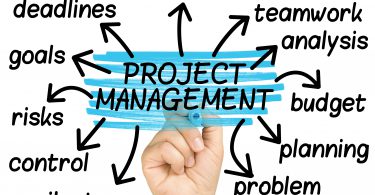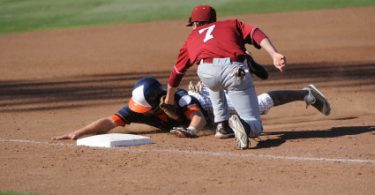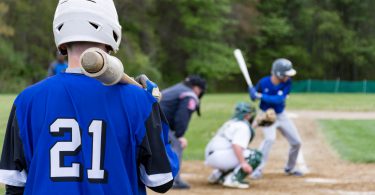Co-authored by Brian Warning
“Balancing the commitment to being a strong student and a great athlete is difficult at the college level. It takes strong management skills and dedication to be great on both ends. For most freshman baseball players, college will be the most challenging experience of their young lives. Building proper habits before arriving is key to helping aid the transition. Study more over the last couple of years of high school. Begin to develop proper nutritional habits. Transform your body and get in the best shape of your life through a proper strength and conditioning program. Young players who arrive on campus in shape, prepared, and eager to learn are more likely to succeed and continue on than their peers.”
– Recruiting Specialist and Former John Carroll University Assistant Coach, Brian Warning
Very soon, thousands of excited freshmen will pour onto college campuses across the country. If you’re about to head to campus for the first time, you probably feel like it’s a dream come true. You should be excited, but you should also be prepared for the challenges you may face in your first year of college. Freshman year, everyone goes through ups and downs. Several years ago, KPB teamed up with former college coach Brian Warning to share insights about the obstacles that first year players are likely to face and what they can expect when they get to campus. These tips have withstood the test of time and still ring true today.
1. The daily “grind”: You’ll be asked to work harder than ever before just to keep up
There are few things that can prepare incoming freshmen for the college baseball workload, even when they know it is coming. A daily schedule may look something like: morning weights, eat, classes, eat, practice, eat, study hall, homework, relax, sleep, and repeat. School work and baseball are more difficult and demanding of your time than ever before. There is so much to do and you will have very little free time in your day. Don’t believe us? Check out this article published a few years ago by an Oral Roberts baseball player on a day in the life of a D1 college baseball player.
Our Suggestion: Embrace it. If it seems like you can’t keep up, take comfort in knowing that just about every college ball player has felt the same way at first. Plan and organize your schedule so you don’t waste any of your valuable time. Your day will be less structured that high school, but you’ll have more to do. Time management is key! College is about growth. Pay attention to successful players. Ask questions. Learn from your mistakes and keep going. You will figure it out!
2. Academics: You will find school to be more challenging and it’s up to you to stay on track
More will be expected of you from an academic standpoint. Classes only meet a few hours per week, meaning you are expected to do more learning and preparing outside of the classroom. Reading and homework, while often not graded, are key to understanding the material and you must keep up in order to be prepared for quizzes, tests, and projects (which make up the bulk of your grade). You will have fewer tests that cover more material, lectures that cover multiple chapters, and professors who will not have the time to make sure you are doing what you are supposed to. This makes it even more important to not fall behind!
Our Suggestion: The most successful learners are engaged learners. Participate in class discussions, ask questions, and seek more information outside of class time. Getting ahead will be a huge key to academic success. With your busy schedule, you cannot rely on catching up if you fall behind like you might have done in high school. Check out our articles for study tips and how to get organized and get ahead. Word of warning: In college, falling behind can be a very serious problem. Some classes have grades based on only 2 tests and a paper and you may not have any chances for “do overs” to fix any early mistakes. Bad grades can threaten everything you have worked for. So, what do you do if you can’t keep up? Get help and get help EARLY! Don’t wait until you’ve missed a due date or failed a test. Most colleges have places you can go to get support with classes, homework, and time management (look for “student services” on the campus website). Some schools have academic support services specifically for athletes. Take advantage of every resource! Make sure you get help as soon as you think you might have a problem.
3. Decision-making and prioritizing: You will be faced with difficult choices and have to prioritize what is most important to you
So many choices and temptations: Should you study? Should you go to a party? Should you join a club or fraternity? Should you stay up? Should you sleep? Should you go home or visit friends at a school nearby? Do you have the time to play one more game of MLB The Show? Should you date? When you first get to college, you will be on sensory overload. So many options and your parents aren’t there to tell you what to do!
Our Suggestion: Understand that by playing baseball, you are sacrificing some of the social opportunities and late nights that non-athletes can get away with. You will make good choices, and some poor choices. Keep learning. If you want to be the best baseball player you can, you will have to get used to telling people “no” when they are asking you to take the time you need away from baseball or school work. Prioritize what is important, and let those priorities guide your decision-making. You will find yourself falling behind if school and baseball are not priorities 1a and 1b. Keep in mind that bad choices can add up and make it impossible for you to play the game you love.
4. Weight Room: You will need to get used to practicing and playing while sore and tired from lifting
You will be lifting and conditioning heavily on a regular basis throughout the school year, especially during fall ball. This will be in addition to practice and everything else you have on your plate. Freshmen often struggle with balancing soreness and fatigue from the weight room with practicing and performing on the field.
Our Suggestion: The weight room is critical! It will take you some time to get comfortable managing the soreness and fatigue that will be inevitable with baseball activity. Talk to your coach and trainers about ways you can make workouts and recovery more efficient and safe. Make sure you follow their instructions carefully. The best players understand that during the Fall, you may not be at optimal performance levels everyday because of weight room activity. But the weight work in the Fall will benefit you in the long run by preventing injuries and providing enduring functional strength and increased flexibility. The starting players on the field at the college level often tend to be the players that have the most physical strength at their respective positions.
You may have noticed that we have not yet covered on-field challenges that newcomers to college baseball are likely to face. In Part 2, we share insights into the baseball-specific obstacles first-year players can expect to face with the increased competition and high expectations of college baseball! Read it by clicking here.







